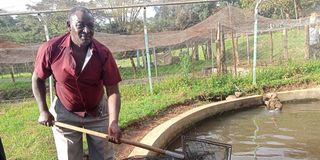Climate change affects survival of rainbow trout fish in Kenya

Mr Richard Gitonga, a worker at Kiganjo National Trout Hatchery. The biting effects of climate change have immensely affected the survival of rainbow trout fish in Kenya and the species is at the verge of extinction.
The devastating effects of climate change have severely impacted the survival of rainbow trout fish in Kenya, threatening the species with extinction.
Drought and heavy rains are extremes that have negatively affected the species at Kiganjo National Trout Hatchery, a cold-water fishery established in 1948 by the Ministry of Agriculture in Mathira, Nyeri County.
Kenya Fisheries Service (KEFS) assistant director of fisheries Eric Opallo said the 10-hectare facility has not been spared the adverse effects of climate change,
"If we continue with this trend of not having proper climate change mitigation measures, we fear that in 10 years’ time, we will lose our rainbow trout. It will not be able to survive because of the increased water temperatures," Mr Opallo told the Nation at the plant.
During the dry season, he said, the water level in the Sagana gets low and other users along the river compete for the same resource. As a result of the scorching sun, water temperatures rise.
"We have cold-water fish, and when we have temperatures of 20 degrees Celsius, they get stressed. That means we have to take other management measures to contain the situation," said Mr Opallo.
Trout are reared in clear, cold flowing water with temperatures between 15 and 18 degrees Celsius.
When there are heavy rains, the water level rises and flows downstream with a lot of debris. He explained that the turbidity of the water is affected and the fish are unable to feed.
The government-owned hatchery has more than 30 raceways and ponds with an average production capacity of 12 tonnes a year.
Rainbow trout (Oncorhynchus mykiss) and brown trout (Salmo trutta) were introduced to the facility immediately after it was established in 1948.
"At that time, brown trout were doing well and had spread to other parts of the country such as the Nairobi River. In our facility, we do not have brown trout because of the effects of climate change," said Mr Opallo.
"Brown trout is one of the species that is considered a water-cooled bio-indicator. This means that where it is present, the water is clean enough for human consumption. It can only survive at very low temperatures compared to rainbow trout, which is a bit more resilient," he added.
To mitigate the effects of climate change, the national hatchery has been sensitising the community to adopt friendly ways of interacting with the environment by minimising deforestation and overgrazing.
The hatchery sells a kilogramme of rainbow trout for Sh1,400, but the price could go up due to climate change.
"We sell a kilogramme of fish at 10 US dollars. With this trend of climate change, it will definitely affect the production and make the prices go higher. We have to put in place more management measures and sources for ingredients," said the expert.
Meat value
"Trout is a species with high economic value. It has a high meat value with a high omega 3 content … We need to address this issue of climate change urgently," he added.
The facility also provides technical advice and sells fingerlings to prospective and existing trout farmers. It also organises educational tours on cold-water fishing.
During the International Conference on Climate Change and Sustainable Development held at Karatina University last month, African countries were urged to renew their commitment to mitigating the effects of climate change.
United Nations Environment Programme Kenya Programme Director Cyrille-Lazare Siewe called on researchers to come up with mitigation strategies.
"Our planet is facing an unprecedented crisis and the urgency of the situation cannot be overstated. A climate-free Africa is a dream that is within our reach, but it will require sustained effort and commitment from all of us," Dr Siewe said.
Emphasis was also placed on promoting sustainable agriculture through conservation agriculture and agroforestry to reduce emissions while improving food security.
The international conference brought together academics, researchers, environmentalists, climate change experts, industry players and special climate-affected groups, including women and youth, from the United States, Canada, East Africa and the United Kingdom.
The theme of the conference was: "Mitigating the impacts of climate change and biodiversity loss on sustainable development: A Call to Action".
"Climate change is a global problem, but its impacts are not evenly distributed. Africa, despite contributing relatively little to greenhouse gas emissions, is already experiencing the worst impacts of climate change. Advocating for climate justice, including fair access to climate finance and technology, is essential to ensure that Africa is not left behind in the fight against climate change," said Dr Siewe.





